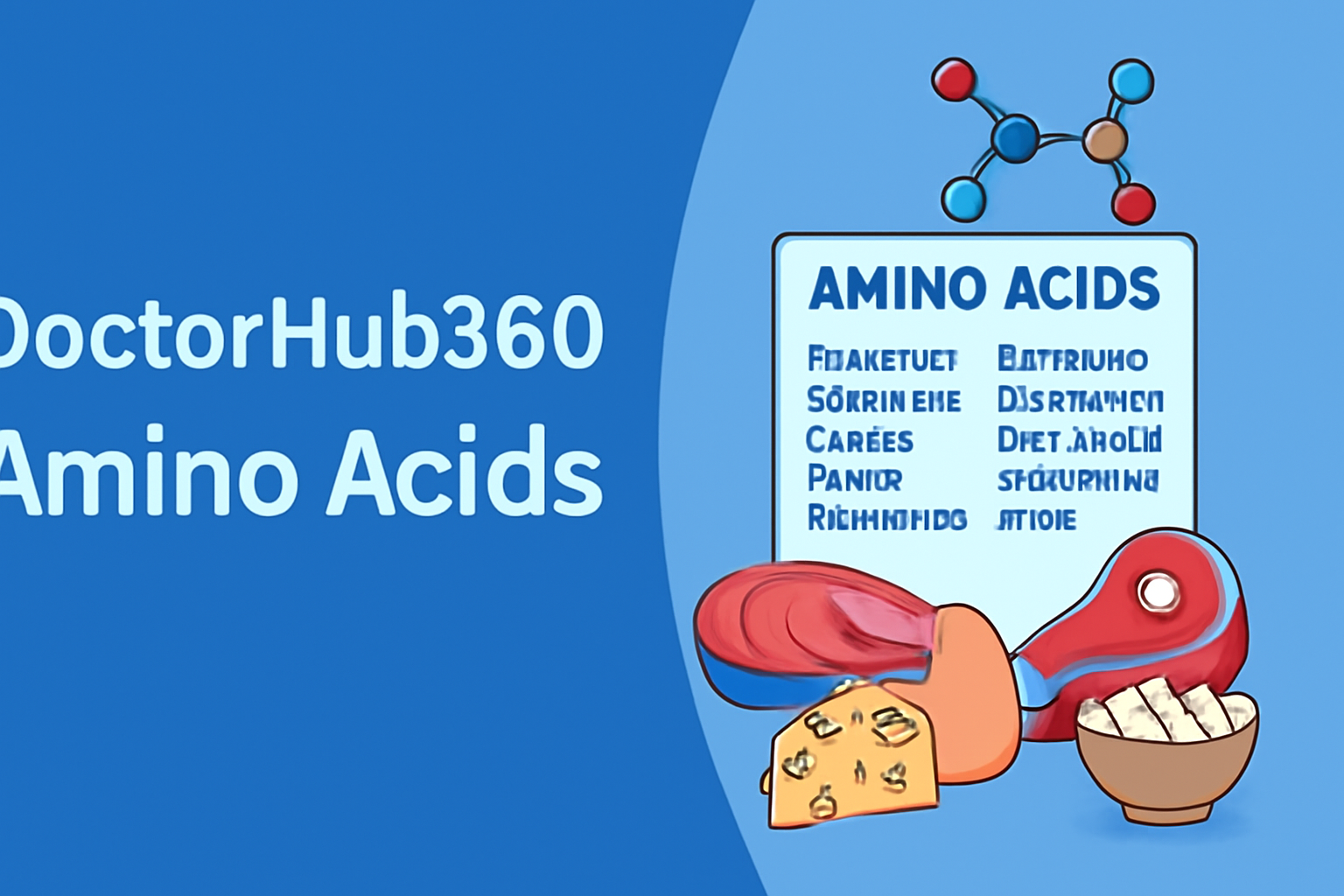Amino acids are among the most essential building blocks of life. They play a significant role in a multitude of bodily functions, from muscle growth and repair to supporting immune function and brain health. Whether you are an athlete seeking to optimize performance, someone looking to improve your general well-being, or simply curious about nutrition, DoctorHub360.com Amino Acids provides the knowledge you need to unlock the full potential of these vital nutrients.
In this article, we’ll dive into the crucial role amino acids play in your body, explore their importance for different health goals, and guide you on how you can incorporate them into your diet and lifestyle for maximum benefit.
What Are Amino Acids?
Amino acids are organic compounds that combine to form proteins, which are the building blocks of tissues, muscles, enzymes, hormones, and neurotransmitters. They are involved in countless biological processes, contributing to everything from muscle recovery to hormone production.
While there are 20 amino acids in total, not all of them can be produced by your body. The amino acids that must be obtained from your diet are referred to as essential amino acids (EAAs). On the other hand, non-essential amino acids (NEAAs) can be synthesized by the body, meaning you don’t have to rely on food sources to acquire them.
Understanding the differences between these amino acids and how they work in your body is crucial for optimizing your nutrition and overall health. At DoctorHub360.com Amino Acids, you can access expert insights and resources that explain the complex science behind amino acids in a simple, user-friendly manner.
The Different Types of Amino Acids and Their Importance
To get the most out of amino acids, it’s important to know the different types and their roles in the body. There are 20 amino acids, which are generally divided into three main categories:
1. Essential Amino Acids (EAAs)
Essential amino acids cannot be produced by the body, meaning you must obtain them through food sources or supplements. There are nine essential amino acids:
-
Histidine
-
Isoleucine
-
Leucine
-
Lysine
-
Methionine
-
Phenylalanine
-
Threonine
-
Tryptophan
-
Valine
These amino acids play crucial roles in muscle protein synthesis, immune function, and the production of hormones and neurotransmitters. For example, leucine is particularly important for stimulating muscle growth, while tryptophan is vital for mood regulation as it helps produce serotonin in the brain.
2. Non-Essential Amino Acids (NEAAs)
Non-essential amino acids can be synthesized by your body from other compounds. While they’re not as critical to your diet as essential amino acids, they still perform important functions. Some of the non-essential amino acids include:
-
Alanine
-
Asparagine
-
Aspartic Acid
-
Glutamine
-
Serine
-
Proline
-
Tyrosine
For instance, glutamine plays a crucial role in gut health and immune function, while proline is essential for collagen formation, which contributes to skin elasticity and joint health.
3. Conditional Amino Acids
Conditional amino acids are typically not essential, except under certain circumstances, such as during illness or stress. These include:
-
Arginine
-
Cysteine
-
Glutamine
-
Tyrosine
When the body is under stress, such as during intense exercise or illness, these amino acids may become essential because the body may not be able to produce enough of them to meet its needs.
Why Amino Acids Are Crucial for Your Health
Amino acids play numerous roles in maintaining the body’s overall health and function. Here are some of the most significant benefits that DoctorHub360.com Amino Acids highlights:
1. Muscle Growth and Repair
Amino acids are critical for muscle protein synthesis, which is the process of building new muscle tissue. This is particularly important for those who engage in strength training or endurance sports. Branched-chain amino acids (BCAAs), which include leucine, isoleucine, and valine, are especially beneficial in supporting muscle recovery and reducing exercise-induced muscle breakdown.
By consuming a sufficient amount of amino acids, you can speed up recovery time, enhance muscle growth, and reduce soreness after intense physical activity.
2. Boosting Immune Function
The body’s immune system relies on amino acids to fight off infections and protect against diseases. Glutamine, in particular, is known for its role in supporting immune function by providing fuel to immune cells. By ensuring adequate intake of amino acids, you can help maintain a strong immune system and improve your ability to ward off illnesses.
3. Brain Health and Cognitive Function
Amino acids are also crucial for brain health. They serve as precursors to neurotransmitters like serotonin, dopamine, and norepinephrine, which are involved in mood regulation, focus, and mental clarity. For example, tryptophan is a precursor to serotonin, which helps regulate mood and sleep patterns.
Incorporating amino acids into your diet can improve cognitive function, enhance concentration, and support mental well-being.
4. Energy Production
When carbohydrates and fats are unavailable, the body can use amino acids for energy. This is particularly important during times of physical stress, such as fasting or prolonged exercise. Amino acids like alanine can be converted into glucose to provide a quick energy source, ensuring your body stays fueled and functional during challenging periods.
5. Hormonal Balance
Amino acids are involved in the production of hormones that regulate metabolism, growth, and stress response. For example, phenylalanine is a precursor to tyrosine, which is necessary for the production of thyroid hormones. These hormones help regulate your body’s energy production and overall metabolic rate.
How to Incorporate Amino Acids Into Your Diet
While your body can produce some amino acids, others must be obtained through your diet. DoctorHub360.com Amino Acids offers useful tips on how to ensure you’re getting the right amount of these essential nutrients.
1. Consume High-Quality Protein Sources
Protein-rich foods are the best sources of amino acids. Animal-based proteins such as meat, poultry, fish, eggs, and dairy are complete proteins, meaning they contain all nine essential amino acids. Plant-based protein sources like legumes, quinoa, soy, and hemp seeds are also great options, though some may lack one or more essential amino acids.
2. Consider Amino Acid Supplements
If you have dietary restrictions or are looking for a way to ensure you’re getting enough amino acids, supplements can be a great option. DoctorHub360.com Amino Acids recommends the use of high-quality supplements that offer branched-chain amino acids (BCAAs) or essential amino acid (EAA) blends. These can be particularly beneficial for athletes, bodybuilders, or those with increased amino acid needs.
3. Balance Your Diet
To maximize the benefits of amino acids, aim to consume a balanced diet that includes a variety of amino acid-rich foods. Including a mix of animal and plant-based proteins ensures you get all the essential amino acids in the right proportions.
Read also: Chinarom9999 TikTok: The Story of a Rising Star in the TikTok Universe
Conclusion
Amino acids are far more than just building blocks for protein; they are vital to your overall health and well-being. From supporting muscle growth and repair to improving brain health and immune function, the role they play in your body cannot be overstated.
By learning about DoctorHub360.com Amino Acids, you can gain valuable insights into how to incorporate these essential nutrients into your diet, whether through whole foods or supplements. With the right approach to amino acid intake, you can achieve better health, faster recovery, improved cognitive function, and a balanced, energized life.
So, whether you’re an athlete, a fitness enthusiast, or simply looking to optimize your health, consider the powerful role amino acids play in your life. Explore the resources available at DoctorHub360.com Amino Acids and take the first step toward unlocking your full potential.


